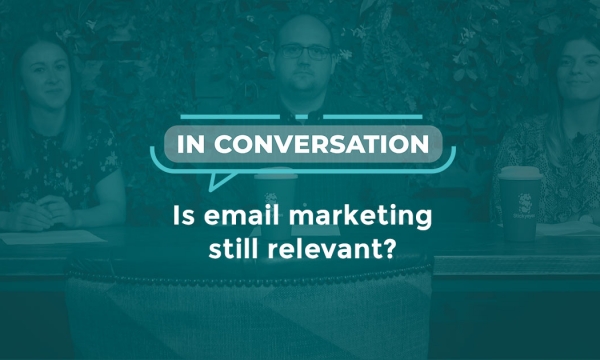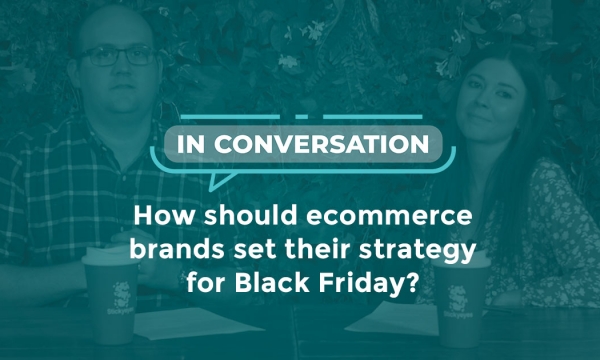In 2020, the Black Friday and Cyber Week sales period will be like no other. The impact of lockdowns, severe questions over consumer confidence, the ability of the logistics network to cope with demand and the pressure on retailers to keep the tills ringing after the annus horribilis for the High Street all make this a unique kick-start to the festive spending spree.
So how do brands and retailers prepare for a Cyber Week and Black Friday strategy for which there is no precedent, no playbook and no certainty? Sarah Barker, Tom Clough and Rebecca Johnson from the Stickyeyes Biddable Media team discussed just how retailers and brands should approach their strategy in 2020.
How should retailers approach Black Friday in 2020?
We know that Black Friday is a major date in the retail calendar on both sides of the Atlantic, but it’s going to look a bit different in 2020. The retail sector in general was hit heavily by the impact of lockdown measures, consumers are naturally nervous to spend and a much greater proportion of what spending there will be is going to shift online.
So with lower consumer confidence and shoppers urged to stay away from physical stores what does Black Friday in 2020 look like?

Rebecca Johnson, Biddable Media Manager
“With social distancing measures in place this year things are definitely going to be different.
“We have seen over recent months brands placing greater importance on online retail and consumer behaviour seems to have shifted that way too. A brand’s online strategy is going to be more important than ever this year and I think we can expect to see a very competitive online market, particularly in paid search, as brands look to maximise their online presence, including those who have had less of a reliance online in the past.”

Tom Clough, Deputy Head of Biddable Media
“Throughout this year we have seen some major players within ecommerce significantly reduce their marketing spend – perhaps one of the most notable ones being Amazon. But I think we’re going to see those retailers come back to the search results pages with more aggressive strategies throughout the Black Friday and Cyber Week period.
“Black Friday brings with it a number of logistical challenges, particularly when it comes to promoting deals in store when we still don’t know what the lockdown environment will look like in different parts of the country. That will naturally cause some retailers to focus more of their efforts into their online channels.”

Sarah Barker, Head of Biddable Media
“The point about the regional lockdowns makes this particularly interesting and it will be extremely important for retailers, especially those with a significant “bricks and mortar” footprint, to keep up to date with the evolving restrictions across different parts of the country.
“That might actually translate into the bid strategies used by retailers. I would expect to see some retailers to take a much more localised approach to their biddable media strategy, increasing the aggression of their ad buying for customers that are in those “tier three” areas – the customers that may be most nervous about heading to stores, assuming they are able to at all.
“The brands that do want to do that are going need to start moving quickly to get that infrastructure in place. They will need to be looking at the different markets that they operate in, forecasting which areas are, or are likely to be, under those tougher restrictions and the stores that might be affected by that, and build a full market landscape.
“I also think we’ll see brands using more channels in this year’s festive rush, given the different circumstances. For example, with more people at home for longer, channels such as Spotify advertising, Sky Adsmart and mobile-first video could play a big role.”
The importance of “reading the mood” of a public that might not be ready for aggressive pre-Christmas advertising.
The marketing press is full of discussion about how many brands will approach their marketing and advertising over this festive period, given the events of the past year. With lockdown restrictions around the opening of shops and leisure venues, as well as a much lower level of consumer confidence, are the public ready for the big-budget, aggressive sales campaigns that we have come to expect?
 Tom Clough
Tom Clough
“This is an interesting point as it could easily go one of two ways. On one hand, I understand the argument that people are going to be much less inclined to spend on non-essentials given the impact COVID has had on consumer spending and confidence - particularly on big-ticket items.
“But at the same time, I would argue that because many consumers have been more restrained with their spending for much of this year, they may actually be more receptive to discounting at a time where we know consumers do expect discounts. Have consumers been putting-off those big-ticket items, knowing the Black Friday and Cyber week is coming?
“Personally, I would expect a surge in demand this year, fuelled by a combination of deeper discounts from retailers that need the cashflow, and higher search demand as more consumers turn to ecommerce for their Christmas gift purchasing. I think this could be the most competitive Cyber Weeks we've seen in ecommerce.”
 Rebecca Johnson
Rebecca Johnson
“I would agree that I would expect to see a lot of demand this year as more and more people, either through choice of necessity, turn to ecommerce.
“It may be that we find that what people buy is different – party wear might be a more difficult sell this year, for example – but people will still spend.
“The key to success will therefore be in what products you can successfully promote and how you promote them.”
 Sarah Barker
Sarah Barker
“When it comes to advertising in the current climate, one of the most important things to consider this year is what you communicate and how sensitively you communicate it.
“No brand should be coming across as trying to capitalise on the current environment in order to boost their online sales and instead, they should be thinking about the messages that will resonate with consumers.
“We've seen so many ads using Facetime and scenarios that consumers can relate to right now, so ask if that is something that you could work into some of your advertising through YouTube, or social media stories. And start thinking about these messages now to grow that engagement ahead of the promotional period, whilst people are doing their research.”
Black Friday is not a short-term event. You need to think about the longer-term.
Black Friday and, to some extent, Cyber Monday, have often be attacked aggressively by retailers, promising big discounts to a consumer base that expects them, and spending big to get that message to market. That burns the candle from both ends as far as margin is concerned.
But should retailers be taking a more long-term view when it comes to these promotions? Whilst spending big on discounting can get cashflow in the short-term, are retailers missing out on longer-term opportunities?
 Sarah Barker
Sarah Barker
“Black Friday and Cyber Week might look like a short-term sales flurry, but success is definitely about the long game. Retailers want to see a huge peak during the month of November, surpassing last year’s targets, but we need to ensure that this growth is sustained.
“You’re going to be attracting a lot of new customers, particularly those who are looking for a discount. But this is Black Friday – a day where your ad costs may be going up at the same time that your margins are at their lowest.
“We need to have metrics like lifetime value (LTV) and profitability front of mind when we build our strategy and ensure that our retention strategy post-Black Friday is just as strong as our tactics for the day.
“When you’re putting together any media or comms plan, it’s absolutely vital that this is extended beyond November from the get-go, with clear retention and growth goals for the long term.”
 Rebecca Johnson
Rebecca Johnson
“Over the Cyber Week period, you will be reaching a lot of new customers and you really need to think about your audience approach. This will be different depending on where customers are in the user journey.
“It’s so important think about what channels are best for awareness, acquisition and retention to make sure you continue to growth.”
 Tom Clough
Tom Clough
“All brands should be mindful of lifetime value and retention on the back of Black Friday.
“By overlaying prospecting activity with lookalike audiences of their historic, high-value customers, brands can increase their chances of driving the types of traffic that will have a higher probability of becoming regular, retained customers based on their online habits & characteristics.
“It's also a good idea to build out multiple remarketing audiences ahead of the event. While we'd expect most traffic to hover almost exclusively around sale pages on-site throughout the week, we want to ensure that our remarketing and retention activity reflects the actions of those visitors that also look in other areas of the site.”
Leveraging those smarter Google Ads features to make campaigns more effective in a crowded market
Black Friday advertising can be a huge logistical challenge, particularly when it comes to running biddable media campaigns. But as more automation is introduced to advertising platforms, do advertisers need to show a greater willingness to embrace these features?
 Rebecca Johnson
Rebecca Johnson
“This is a great opportunity to leverage the automation features Google has available.
“Be sure to use the bidding strategies that are most aligned with your KPI’s for that piece of activity. That might be to maximise conversions across remarketing, or target impression share for awareness.
“We have seen great results from using these features across a range of clients and it is important to stress that this takes lot of pressure away from the process of manual bidding. It means that we spend more of our time on time on strategy and implementation.”
 Tom Clough
Tom Clough
“Automation has a huge part to play in this year's Cyber Week activity, but I also think that this should extend to Smart Shopping for most retailers.
“The work to optimise your shopping feeds to include product information that is crucial to your business, such as product margin, ROI, sale items and incentivised products should be undertaken now. It will give you more options for campaign segmentation & targeting throughout peak season.”
 Sarah Barker
Sarah Barker
“If you're not using them already, consider things like “if statements” and ad customisers - particularly if you're a retailer with a huge catalogue of products.
“Customisable ads allow you to update copy with feed info for offers, pricing, etc - particularly if its relevant. If you have rapidly changing deals customisers are a way to avoid mass activating, scheduling and pausing ads – key points in the process where human error can creep in.
“This goes for audiences too - don’t just blanket message and think how you can customise and push an offer that suits your end user.”
Think about audience, use the automation and navigate your brand through this most unpredictable Black Friday and Cyber Week.
This year, Black Friday strategy must focus on audience. Focus on the messages that those audiences want to hear, focus on how you can deliver what they want and focus on how you can convert promotional shoppers into long-term loyal consumers.
 Tom Clough
Tom Clough
“This year represents the most unpredictable Black Friday we have seen. We don’t know how consumers are going to respond to this period and with bricks and mortar stores under different forms of lockdown in different parts of the country, it’s hard to judge just how consumers will spend.
“It makes the point of using automated bidding strategies much more pertinent. This will allow advertisers to use machine learning to respond efficiently to fluctuations in demand in real-time. It should be a key part of most retailer's strategy.”
 Sarah Barker
Sarah Barker
“Think about the bigger picture. Strong tactics are obviously going to be key in driving performance on the day. But for your message to really have an impact, your SEO team needs to be super aligned with PPC, and PPC totally aligned with Paid Social, or TV. “It’s not a short game where each team is out for themselves to drive the biggest numbers possible.
“Have an overarching marketing strategy, share data and plans across your departments. This is the way you'll be able to take your users on a seamless journey from Black Friday research, to purchase, to upsells and eventually re-engagement at a later date.”
 Rebecca Johnson
Rebecca Johnson
“Having an audience-first approach is really important. As we've already touched upon, we need to be thinking about how we are going to encourage users to move through the funnel and eventually convert.
“Make sure to consider how you are going to reach these users and what message you want to get across to them.”





